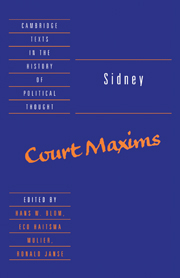Book contents
- Frontmatter
- Contents
- Preface
- Note on the text
- Introduction
- Principal events in Sidney's life
- Bibliographical note
- Biographical notes
- Court Maxims
- First Dialogue
- Second Dialogue
- Third Dialogue
- Fourth Dialogue
- Fifth Dialogue
- Sixth Dialogue
- Seventh Dialogue
- Eighth Dialogue
- Ninth Dialogue
- Tenth Dialogue
- Eleventh Dialogue
- Twelfth Dialogue
- Thirteenth Dialogue
- Fourteenth Dialogue
- Fifteenth Dialogue
- Index of biblical quotations
- Index of proper names
- Index of subjects
- Cambridge Texts in the History of Political Thought
Tenth Dialogue
Published online by Cambridge University Press: 05 June 2012
- Frontmatter
- Contents
- Preface
- Note on the text
- Introduction
- Principal events in Sidney's life
- Bibliographical note
- Biographical notes
- Court Maxims
- First Dialogue
- Second Dialogue
- Third Dialogue
- Fourth Dialogue
- Fifth Dialogue
- Sixth Dialogue
- Seventh Dialogue
- Eighth Dialogue
- Ninth Dialogue
- Tenth Dialogue
- Eleventh Dialogue
- Twelfth Dialogue
- Thirteenth Dialogue
- Fourteenth Dialogue
- Fifteenth Dialogue
- Index of biblical quotations
- Index of proper names
- Index of subjects
- Cambridge Texts in the History of Political Thought
Summary
Ninth Court Maxim: Union with France and war with Holland is necessary to uphold monarchy in England, or thus, a strict friendship is to be held with the French that their customs may be introduced and the people by their example brought to beggary and slavery quietly
Philalethes: the king is fixed in this resolution as the whole course of his actions do show ever since he came to the crown. The first he did was absolutely to break the agreement made with the Spaniard.
Then soon followed the match with Portugal, the assaulting and sacking *of* some of the Spanish plantations in the West Indies. And the evidence is completed in his selling Dunkirk to the king | of France.
Eunomius: what advantage can be expected from France for all this?
Philalethes: the king of France well understands how great the power of money is in our court, and has disbursed large sums to some of our ministers, to his great advantage. There is nothing so secret in our court, but by the next post it is known at Paris, and all businesses are represented to the king in such colours as most agree with the French interest. The king of France made peace with Spain at his match with the infanta thereof, which so amazed the king of Portugal that all underhand assurances of assistance from France were not sufficient to satisfy him.
- Type
- Chapter
- Information
- Sidney: Court Maxims , pp. 152 - 154Publisher: Cambridge University PressPrint publication year: 1996



